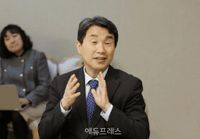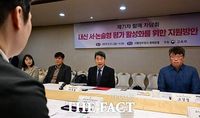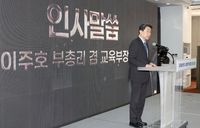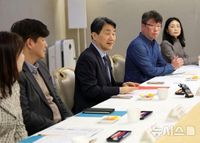On March 21, 2025, Deputy Prime Minister Lee Joo-ho, who also serves as the Minister of Education, took the stage at the Government Seoul Complex Building in Jongno-gu, Seoul, for the 71st Hamkke Chadamhoe. This significant meeting aimed to address the pressing need to enhance Naesin Seo-Nonsul-type evaluations within the South Korean education system.
The forum brought together educators and officials to discuss policy support plans designed to activate these evaluation methods, which aim to assess students' creativity and problem-solving skills rather than merely their memorization of facts.
Lee emphasized the consequence of traditional evaluation methods, stating, "Innovation in student evaluation is necessary to cultivate students' future capabilities such as creativity and problem-solving skills." This remark highlights a shift away from the rigid and often criticized multiple-choice tests previously employed in the educational system.
Addressing a room full of experienced educators, including members of the Student Evaluation Support Group, Lee further asserted, "We will actively support the activation of Seo-Nonsul-type evaluation by communicating with teachers." His commitment reflects a broader movement towards innovative assessments that better measure essential skills.
The meeting also sought to find solutions to substantial challenges teachers encounter with question development and scoring in Seo-Nonsul-type evaluations. Educators and policy makers exchanged ideas on how to make these evaluations more effective and widely implemented.
While there are advantages to this new evaluation format—specifically, its potential to provide deeper insight into student capabilities—uncertainties persist. Concerns about fairness, reliability, and increased grading burdens have been voiced among educators, creating a dilemma that must be resolved to successfully transition from traditional assessments.
In context, the discussions held during the Hamkke Chadamhoe are part of an ongoing evolution in South Korean education. In 2023, Lee Joo-ho mentioned a comprehensive 2028 admissions reform plan, which aims to reconfigure how evaluations shape both classroom and standardized testing environments.
Participants were adamant that enhancing Seo-Nonsul-type evaluations could produce more holistic educational outcomes. Despite the potential for additional pressures on both teachers and students, the push for change reflects a consensus on the necessity for modern educational practices.
Furthermore, the introduction of the high school credit system and discussions surrounding the Korean SAT also suggest an educational landscape undergoing significant change. These developments add urgency to the need to adapt evaluation methods to keep pace with evolving educational standards.
Each conversation at the Hamkke Chadamhoe helped clarify the educational community's stance: there is a strong belief that traditional testing formats must be gradually overhauled to prioritize learning differences among students while still maintaining rigorous academic standards.
In closing, Lee Joo-ho’s determined advocacy for Seo-Nonsul-type evaluations signifies a pivotal moment in South Korea’s educational direction. His government seems committed to ensuring students are evaluated in ways that hold real-world relevance, nurturing the capabilities that will be essential in a fast-changing future.







